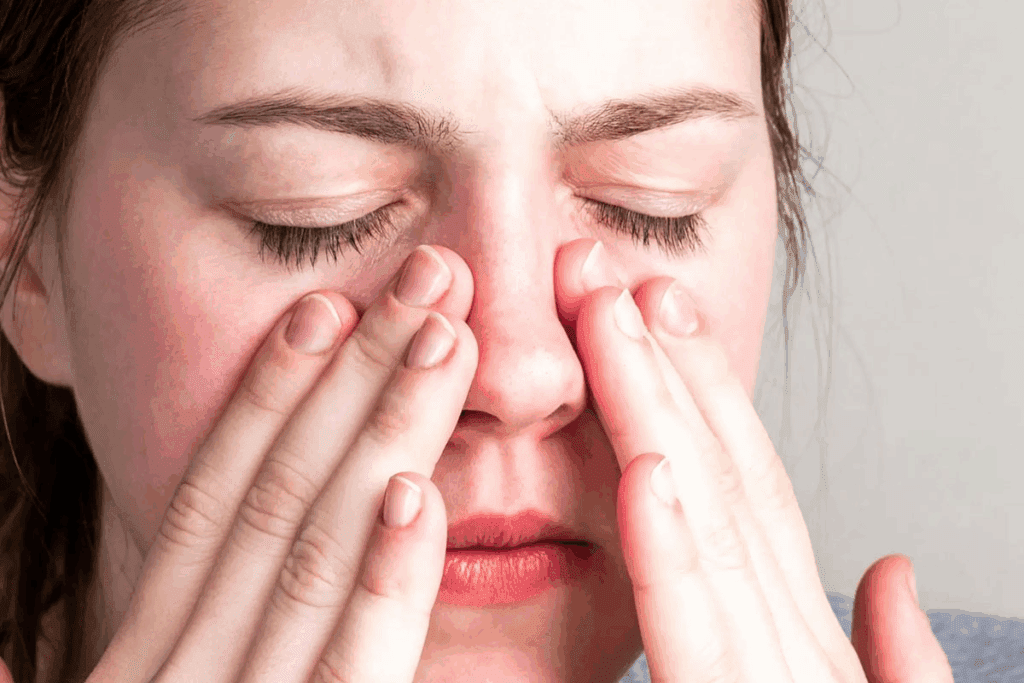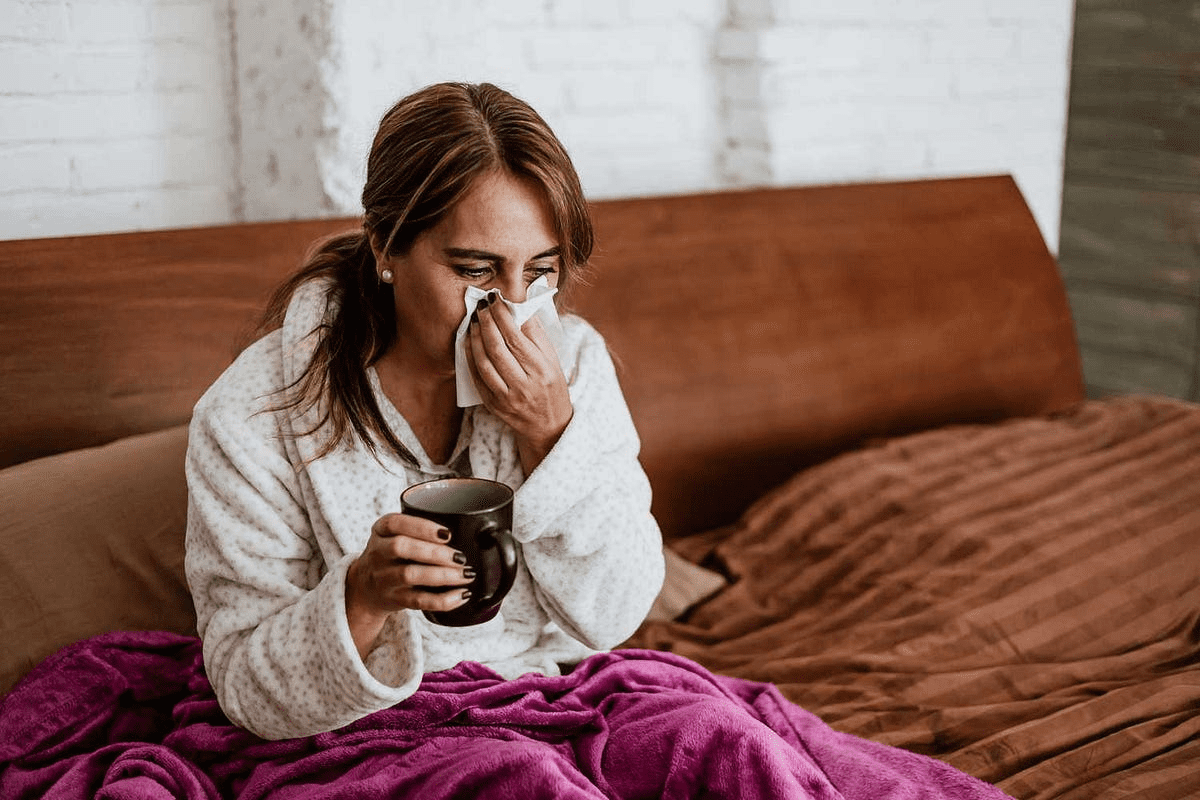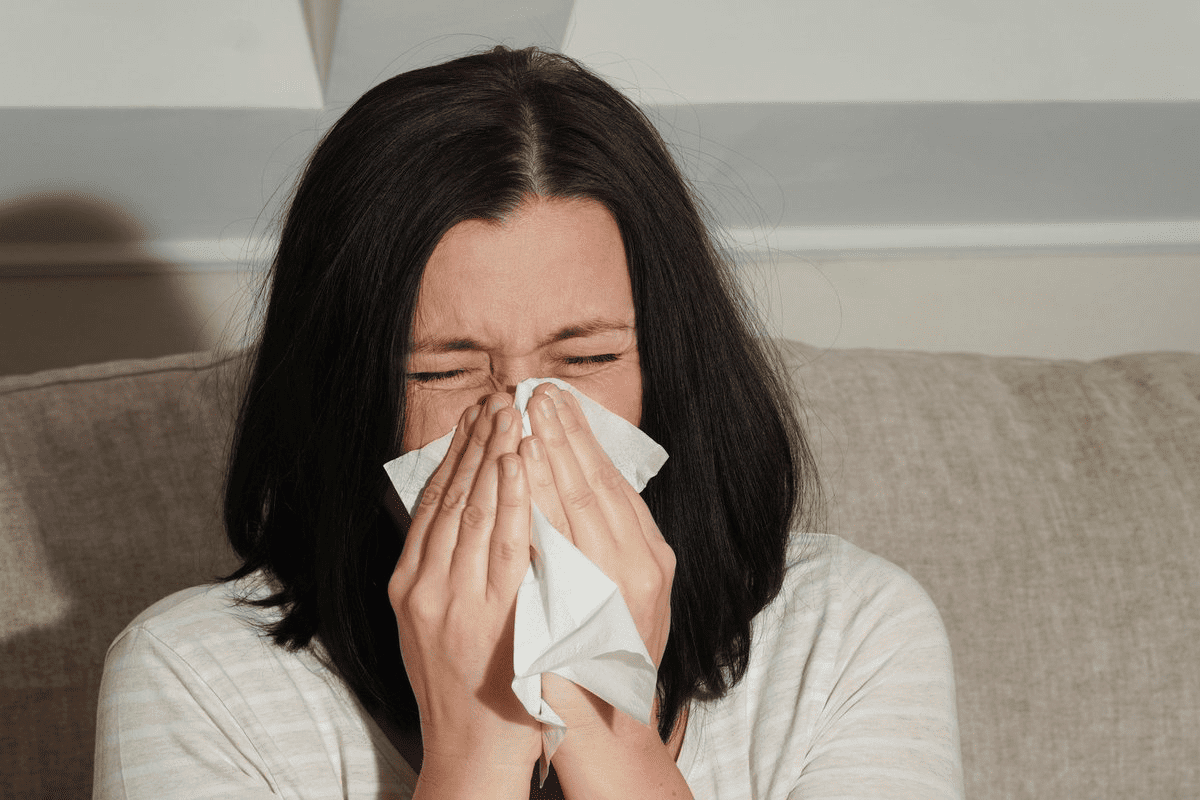Last Updated on November 27, 2025 by Ugurkan Demir

Feeling nasal congestion, facial pressure, and unexpected muscle aches and chills can be puzzling. At Liv Hospital, we know that sinus infections affect more than just your nose. Your overall health is what we care about.
Many people wonder if these body aches come from their sinus infection or if there’s something more serious going on. Sinusitis, affecting about 31 million in America yearly, can lead to body aches. This happens when your body fights off viruses or bacteria.
We will look into how sinus infections and body aches are connected. This will help you understand your symptoms better.
Sinus infection body aches: Learn why a severe infection can cause generalized body aches and flu-like systemic symptoms.

To understand sinus infections, we must first know what sinuses are and how they work. Our sinuses are air-filled spaces around the nasal passages. They make mucus to filter, humidify, and warm the air we breathe.
The sinuses, or paranasal sinuses, are lined with a mucous membrane. They are connected to the nasal passages. They help by making mucus to trap dust, bacteria, and other harmful particles, keeping them from our lungs. Normal sinus function is key for good respiratory health.
Sinusitis, or sinus infection, happens when the sinuses get inflamed or infected. This can be due to viruses, bacteria, or fungi. There are different types of sinusitis, like acute, subacute, chronic, and recurrent, each lasting a different time and showing different symptoms. Knowing the type of sinusitis is important for the right treatment.
Sinusitis can affect any of the four types of sinuses: maxillary, ethmoid, frontal, or sphenoid. It can be caused by allergies, colds, or issues like nasal polyps or a deviated septum.
Sinusitis is a common health issue in the United States. About 31 million people get sinusitis every year. This shows how important it is to understand sinus infections and their effects on health. The cost of treating sinusitis is huge, with billions spent on treatments and lost work each year.
Knowing how common sinusitis is and understanding its types helps us find ways to prevent and treat it. This can lessen the impact of sinus infections on people and society.

Sinus infections and body aches are linked through the immune system’s fight against pathogens. When a sinus infection happens, the body’s immune system kicks in. This leads to the release of various chemical mediators.
Sinus infections can cause body aches due to the body’s inflammatory response. When the immune system finds an infection, it releases cytokines and other inflammatory chemicals. These can make muscles and joints uncomfortable.
These chemicals are part of the body’s defense against invaders. But they can also cause symptoms like body aches, fatigue, and feeling unwell.
The immune response to sinus pathogens involves many immune cells, like macrophages and T-cells. These cells work together to get rid of the infection. But in doing so, they can damage tissues and cause symptoms like body aches.
“The immune system’s response to infection is a double-edged sword; while it’s essential for fighting off pathogens, it can also lead to uncomfortable symptoms like body aches.”
Why some people feel more pain during a sinus infection varies. It depends on the infection’s severity, how the immune system responds, and overall health.
Factor | Influence on Body Pain |
Severity of Infection | More severe infections tend to cause more pronounced body aches. |
Individual Immune Response | Variations in immune response can affect the intensity of body aches. |
Overall Health | Pre-existing health conditions can exacerbate body aches during a sinus infection. |
Knowing these factors can help manage and treat sinus infection-related body aches better.
It’s important to know the difference between viral and bacterial sinus infections. This knowledge helps in treating and managing symptoms. Sinus infections can really affect your life, causing symptoms like nasal congestion and body aches.
Viral sinusitis is the most common type and usually goes away in one to two weeks. Symptoms are similar to a cold, including nasal congestion and facial pressure. Body aches are common in viral sinusitis because of the body’s fight against the virus.
Usually, viral sinusitis doesn’t need antibiotics because they don’t work on viruses. Treatment aims to ease symptoms and help the body heal naturally.
Bacterial sinusitis is less common but can be more serious. It causes more severe body aches and systemic symptoms like fever and fatigue. You’ll also notice thick, yellow or green nasal discharge.
If you have bacterial sinusitis, you might need antibiotics. It’s important to know if your sinus infection is bacterial to get the right treatment.
Telling viral from bacterial sinusitis can be tricky because symptoms are similar. But, some clues can help. Look at how long symptoms last, the type of nasal discharge, and how severe the symptoms are.
Characteristics | Viral Sinusitis | Bacterial Sinusitis |
Duration | Typically resolves within 1-2 weeks | May persist beyond 7-10 days |
Nasal Discharge | Clear or slightly colored | Purulent (thick and yellow or green) |
Body Aches | Common, generally mild to moderate | More severe, often accompanied by fever |
Treatment | Symptom relief, supportive care | May require antibiotics |
Knowing the difference between viral and bacterial sinus infections helps doctors give better treatments. This improves patient outcomes and lowers the risk of serious problems.
Body aches with sinus infections are not random. They happen because of how our immune system reacts to the infection. When we get a sinus infection, our body fights it hard. This fight can make us feel body aches.
The body’s defense against infections is called inflammation. When we have a sinus infection, our sinuses get inflamed. This leads to more mucus and immune cells getting active. This inflammation can spread and cause body aches.
The body’s fight against infection includes widening blood vessels and more immune cells moving to the infected area. These actions help fight the infection but can also release chemicals that cause pain and discomfort.
Cytokines are key in our immune response to infections. During a sinus infection, certain cytokines like TNF-alpha and IL-6 are released. These cytokines can make muscles and joints hurt by activating pain receptors and making more inflammation. This is why body aches are common with sinus infections.
The pain caused by cytokines is not just in one place. It’s a body-wide response. This is why people with sinus infections often feel pain all over, not just in one spot.
Dehydration also plays a part in body aches with sinus infections. Sinus infections can make it hard to breathe and smell, leading to less drinking. Also, the body’s increased activity during infection can cause more fluid loss. Dehydration can make muscles cramp, feel tired, and ache, making symptoms worse.
It’s important to drink lots of water when you have a sinus infection. Drinking helps thin out mucus, helps it drain, and supports the immune system.
When the body fights a sinus infection, it may show fever and chills. These signs mean the immune system is working hard. You might also feel muscle and joint pain, similar to the flu.
The body’s temperature control is complex. It involves the hypothalamus, our internal thermostat. When we get a sinus infection, our immune system makes pyrogens. These cause fever, helping to fight off the infection.
We’ll look into how this affects our body and how it deals with sinus infections.
Fever is common in acute sinusitis. Adults usually see a fever between 100°F and 102°F. Along with chills, fatigue, and body aches, this fever is a sign of the infection.
Fever Range (°F) | Common Symptoms | Typical Duration |
100-102 | Chills, fatigue, body aches | 3-7 days |
Chills and fever are usual with sinus infections. But, sometimes they mean something more serious. If your fever is over 103°F, lasts too long, or comes with severe headache, stiff neck, or trouble breathing, it could be a sign of a bigger problem.
Can sinusitis cause body aches without fever? Or is it a sign of something else? Sinusitis is an inflammation or infection of the sinus cavities. It can lead to body aches, even without a fever.
Diagnosing sinus infections can be tricky. Some people might feel body aches without fever. This is because their immune system is fighting off the infection.
The immune system’s reaction to pathogens in the sinuses can trigger the release of cytokines. These proteins help fight infections but can also cause pain in muscles and joints.
A study in the Journal of Infectious Diseases found that body aches without fever might be due to inflammation. It’s not always because of the infection itself.
“The complex interplay between the immune system and the pathogens involved in sinusitis can lead to a variety of symptoms, including body aches, even in the absence of fever.”
Several factors can affect whether sinusitis causes body aches without fever. These include:
Factor | Influence on Symptoms |
Type of Pathogen | Viral infections may cause more systemic symptoms like body aches without fever. |
Severity of Infection | More severe infections are likely to cause both body aches and fever. |
Individual’s Health | People with compromised immune systems may experience atypical symptoms. |
It’s hard to tell if body aches are from sinusitis or something else. It’s essential to consider the broader clinical picture. This includes nasal symptoms, facial pressure, and other systemic symptoms.
While many colds and flu can be treated at home, severe body aches without fever need medical attention. This is to rule out other conditions.
Sinusitis can cause more than just face pain. It can affect your whole body. Symptoms like nasal congestion and facial pain are common. But, there are many more symptoms that can impact your health.
Fatigue is a common symptom of sinusitis. Your body fights the infection, making you feel tired and weak. This tiredness can also affect your mind, making it hard to focus.
The body’s fight against the infection leads to malaise. This is because of the chemicals and cytokines released. They can make you feel exhausted and uncomfortable.
Headaches and facial pressure are common in sinusitis. The pressure in your sinuses can spread to your face and head. This can cause a lot of pain.
The pain from sinusitis headaches can get worse with certain movements. Bending or straining can increase the pressure. Knowing how sinus pressure affects headaches is key to managing the pain.
Nasal symptoms like congestion and runny nose are linked to sinus infections. These symptoms can also make your body feel uncomfortable. For example, congestion can make it hard to breathe, leading to tiredness.
The table below shows how nasal symptoms of sinusitis can affect your body comfort.
Nasal Symptom | Impact on Body Comfort |
Congestion | Breathing difficulties, restless sleep |
Runny Nose | Discomfort, need for constant nasal care |
Postnasal Drip | Sore throat, coughing, discomfort |
Knowing the symptoms of sinusitis helps you understand your condition better. Symptoms like fatigue, headaches, facial pressure, and nasal discomfort are all part of it. This knowledge can help you seek the right care.
When sinus infections cause body aches, it’s important to get a correct diagnosis and treatment. We’ll look at how to diagnose sinus infections, the treatment options, and managing both sinus and body aches.
Diagnosing sinus infections means checking symptoms and sometimes using imaging tests. A doctor will look at your medical history, do a physical exam, and might use tools like nasal endoscopy or CT scans to confirm the infection.
The steps to diagnose include:
Over-the-counter (OTC) medications can help with pain and discomfort from sinus infections. Common OTC pain relievers are:
It’s important to follow the dosage instructions and talk to a doctor if symptoms don’t get better or get worse.
Antibiotics can get rid of a bacterial infection. But they only work for bacterial sinusitis, not viral infections. A doctor will decide the best treatment based on the infection’s cause and how bad it is.
Treatment plans should tackle both sinus symptoms and body aches. This might include:
By treating both sinus symptoms and body aches, patients can find full relief from sinus infections.
Managing sinus infection symptoms like body aches and chills can be done at home. Using home remedies and self-care can help ease discomfort. These methods support your body’s recovery.
Staying hydrated is key when you have a sinus infection. Drinking lots of fluids thins mucus, making it easier to get rid of. It also prevents dehydration, which can make body aches worse. Increasing fluid intake can include warm liquids like tea or broth, which soothe a sore throat.
Nutrition is also important for fighting off infection. Eating a balanced diet with fruits, vegetables, and whole grains gives your body the nutrients it needs. Foods rich in vitamin C, like citrus fruits and leafy greens, help boost your immune system.
Steam therapy is a great home remedy for sinus relief. It loosens mucus, reduces congestion, and eases sinus pressure. You can get steam by taking a hot shower, using a steam humidifier, or inhaling steam from a bowl of hot water with a towel over your head.
Nasal irrigation with a saline solution also helps a lot. It clears out mucus and debris, promoting drainage and reducing sinus pressure. Using a neti pot or a squeeze bottle with a saline solution is a good way to do nasal irrigation.
Getting enough rest is vital for recovering from a sinus infection. Sleep and avoiding hard activities let your body fight the infection. Creating a restful environment, like a cool, dark, and quiet bedroom, improves your sleep quality.
Using natural anti-inflammatory methods can also help with sinus symptoms. Herbs and spices like ginger and turmeric have anti-inflammatory properties. They can reduce sinus inflammation and body aches. You can add them to teas, soups, or take them as supplements.
By using these home remedies together – staying hydrated, eating well, using steam therapy and nasal irrigation, resting, and using natural anti-inflammatory methods – you can manage sinus infection symptoms. This helps your body recover.
It’s important to know the difference between a cold, the flu, and a sinus infection. This knowledge helps you pick the right treatment and when to see a doctor.
Preventing sinus infections is key to avoiding their pain and discomfort. Keeping your nose clean, avoiding allergens, and drinking plenty of water can help a lot. These steps can lower your chance of getting a sinus infection.
If you keep getting sinus infections, managing them long-term is vital. You might need to work with a doctor to create a treatment plan. This plan could include medicines, changes in your lifestyle, or other specific steps for you.
We stress the need for taking care of your health and getting the right care when needed. Taking these steps can help you deal with sinus infections better. This way, they won’t disrupt your daily life and health as much.
Yes, sinus infections can cause body aches. This happens because the body fights off the infection. This fight can lead to inflammation and pain in muscles and joints.
Yes, sinusitis can cause body aches without fever. Some people may not show typical symptoms of sinus infections. The severity of the infection and how the body reacts can affect symptoms.
Sinus infections cause body aches and chills because of the body’s immune response. This response leads to inflammation and muscle pain. Chills are also a natural response to infection.
To tell if body aches are from sinus infections or something else, look for other sinus symptoms. These include nasal congestion, facial pressure, and headaches. Always see a healthcare professional for a proper diagnosis.
Yes, sinus infections can cause body pain and fatigue. This is due to the body’s immune response. It can lead to inflammation, muscle pain, and feeling generally unwell.
Systemic symptoms of sinusitis include fatigue, general malaise, headaches, facial pressure, and nasal symptoms. These can make you feel uncomfortable and achy.
Diagnosing sinus infections with body aches involves a medical evaluation. This includes imaging studies and laboratory tests. A thorough review of symptoms and medical history is also important.
Treatment for sinus infections with body aches includes over-the-counter pain management. Prescription treatments, like antibiotics, are also used. Home remedies like hydration, steam therapy, and nasal irrigation can help too.
Yes, sinus infections can cause long-term body aches if not treated properly. This highlights the need for prompt and effective treatment.
To prevent sinus infections and body aches, maintain good sinus health. Practices like nasal irrigation, avoiding allergens and irritants, and seeking prompt treatment for infections are key.
Subscribe to our e-newsletter to stay informed about the latest innovations in the world of health and exclusive offers!